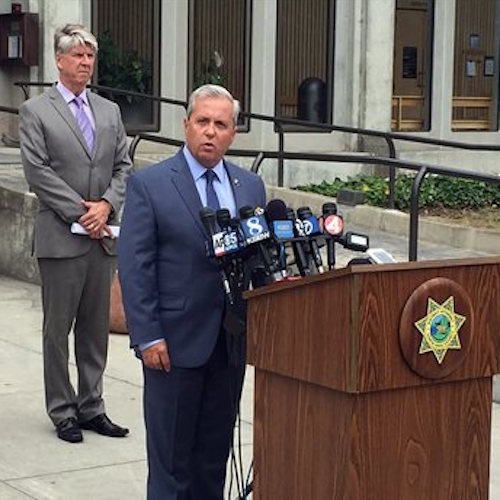Sign up for The Media Today, CJR’s daily newsletter.
Editors at the San Francisco Chronicle learned the identity of a teenage boy in police custody Tuesday who was suspected of sexually assaulting and murdering an 8-year-old girl in nearby Santa Cruz, CA. Initially, the paper withheld his name.
“Stunned neighbors described the boy as kind, mild-mannered and the last person they would suspect of committing such a horrific crime,” the Chronicle reported. “His name has not been released because he is a juvenile.”
But on Wednesday, prosecutors announced that the 15-year-old would be charged as an adult; thus, his name became public—in government records and, within minutes, in sweeping news coverage.
“It’s a simple rule of thumb,” veteran Chronicle reporter Henry K. Lee explains. “Is he charged as an adult? Yes? Boom, we run the name.”
Justifying that rule, however, is not so simple. Every news organization we monitored declined to name the boy before he was charged and did name him afterward. KSBW-TV, the NBC affiliate on California’s Central Coast, was so cautious as to blur early footage of the suspect in handcuffs. Once prosecutors disclosed his identity, many outlets, including KSBW, published his name and even photos and video from his Instagram account.
The process of trying minors as adults is controversial and varies widely from state to state. In general, the “adult” designation allows for longer sentences than are available in the juvenile system. Fundamental steps to protect children, such as hiding their identities, are often tossed aside by the legal system once the “adult” label is affixed. Is there a difference between how the government handles such cases and how news organizations should cover them, especially before a conviction?
“The decision in this case really wasn’t difficult,” KSBW News Director Lawton Dodd says. “It’s not an unusual policy to have.” He adds, “I think it’s impossible to deny the fact that there’s probably a competitive aspect of it. Audiences aren’t going to defer to the station that has the higher perceived ethical standards.”
The charges facing the teenager are heinous, but often ethical standards are best evaluated in extreme instances. Case-by-case flexibility, as some propose, can be viewed as admirable, or arbitrary.
Like the Chronicle, the San Jose Mercury News has a policy based on what charges are brought against a suspect. “We’re generally following the lead of the criminal justice system,” explained Bert Robinson, managing editor at the Mercury News. One exception occurs when some violent crimes in California are tried in juvenile court proceedings open to the public. That likely would have happened had the Santa Cruz teenager been charged as a minor. Publishing the boy’s name under those circumstances, Robinson said, “would’ve been a much tougher decision.”
It’s worth noting that there is no law against publishing the name of a child tried in closed juvenile court, as a recent KSBW editorial stated when explaining the decision to broadcast the name of a 17-year-old hit-and-run suspect when he was on the loose, then withholding his name after his arrest. Also worth noting is the practice of some jurisdictions to name minors not charged as adults, as one Florida sheriff’s office reportedly does for anyone charged with a felony or more than three misdemeanors.
If convicted, the Santa Cruz murder suspect faces life in prison. The Santa Cruz Sentinel, which published his name, also published an editorial on Thursday asking, “Is justice done, and society protected, by charging a juvenile accused of a heinous crime as an adult?” It notes that in 2000, Californians voted to require adult trials for anyone 14 or older charged with murder or certain sex crimes. In 2005, the US Supreme Court deemed executing juveniles unconstitutional, and in 2012 the court struck down laws mandating life imprisonment without the possibility of parole for minors.
The frequency of adult charges for minors, sometimes as young as 10, is morally outrageous to many. Thompson questions whether withholding names on those grounds is within his paper’s discretion, especially when the government has already stated a name and many in the public have heard it. But that didn’t stop some publications from declining to run Charlie Hebdo cartoons or photos of ISIS beheadings, although those were also all over the internet.
“The public is almost always best served by giving more information, not less,” says Al Tompkins, a Poynter Institute faculty member who authored guidelines on publishing the names of minors for the Radio Television Digital News Association. He endorses a lengthy list of considerations, including the age of the child, the prominence of the crime, and the strength of the evidence.
“I think we can set up a strong framework,” Tompkins says, “but ethics are almost always circumstantial. ‘Never’ and ‘always’ often trap us.”
Two years ago, a group of boys from a high school near San Jose sexually assaulted a classmate, who later committed suicide. Robinson says the Mercury News knew the boys’ names from the beginning, but they were tried in juvenile court and their names were not made public. The Mercury News never disclosed their names, despite intense pressure from the community and the victim’s family.
“If we had put their names on our website, then people googling the names of those boys 10 years from now would find that story,” Robinson says. “The biggest punishment that’s going to come to them is going to be us naming them.”
The Santa Cruz teenager will likely face far greater punishment than publicity. But if he had been tried as a minor for the same crimes, most outlets would not have published his name. For journalists, merely following the government’s lead is not a convincing rationale.
Has America ever needed a media defender more than now? Help us by joining CJR today.



